UK Foreign Policy Priorities and Transatlantic Relations
Sir Peter Westmacott, British Ambassador to the United States
Photos
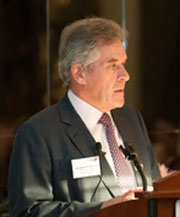 Washington, DC—On November 1, 2012, Sir Peter Westmacott, British Ambassador to the United States, addressed WFPG on “UK Foreign Policy Priorities and Transatlantic Relations” at an Embassy Series event moderated by Washington Post Senior Diplomatic Correspondent Karen DeYoung at his residence. Sir Peter discussed the UK’s continued commitment to eradicating global poverty, UK membership in the European Union and the escalating situations in Iran and Syria. The ambassador also spoke about his administration’s support of initiatives for preventing sexual violence and the subject of Scottish independence. Washington, DC—On November 1, 2012, Sir Peter Westmacott, British Ambassador to the United States, addressed WFPG on “UK Foreign Policy Priorities and Transatlantic Relations” at an Embassy Series event moderated by Washington Post Senior Diplomatic Correspondent Karen DeYoung at his residence. Sir Peter discussed the UK’s continued commitment to eradicating global poverty, UK membership in the European Union and the escalating situations in Iran and Syria. The ambassador also spoke about his administration’s support of initiatives for preventing sexual violence and the subject of Scottish independence.
In his remarks, Sir Peter identified Syria, sanctions on Iran, Israel and Palestine, Mali and its implications for foreign security, and Afghanistan as the major foreign policy challenges the US and the UK will have to confront in the coming months.
On Iran, the ambassador stressed the importance of working through the international community and using international law to move Iran away from nuclear weapons. The UK is pursuing political talks and tighter sanctions in hopes that Iran will be forced to engage with the international community. Sir Peter acknowledged that sanctions on Iran are working, but that the engagement process is still very incremental. Regardless of Iran’s response, Sir Peter finds it important that the international community recognizes that international organizations and individual countries did everything they could to prevent Iran from becoming a nuclear power. According to Sir Peter, at this time, no options are off of the table.
When asked about the use of drones, Sir Peter voiced his support, acknowledging they are now a part of modern warfare and noting that they are precise, bring less risk, and are less expensive. On the other hand, Sir Peter added that drones also raise an array of complicated issues such as a country’s sovereign consent and entitlement to take action. These questions are gaining more media attention in the UK in the wake of the yet undecided case of Noor Khan, who is suing the British foreign affairs office for their role in the wrongful death of his father—killed in a drone attack in Pakistan—and calling for an investigation of the UK’s role in providing intelligence to the US for its drone attacks.
Regarding the growing skepticism in the UK of the EU resulting from the European debt crisis, Sir Peter acknowledged that relations with the EU are more difficult today, but hoped it would not come to a vote on whether the UK should leave the EU. Prime Minister David Cameron is under a lot of pressure to balance domestic and regional interests and the level of participation of the UK in the EU.
Sir Peter also commented on international cooperation to address issues, like sexual violence and poverty. He described the increased efforts of the UK, the UN, and Secretary Hillary Clinton to make eradicating sexual violence a top priority. The ambassador underlined the UK’s desire to end global poverty and its continued commitment to giving assistance to developing countries, citing British Prime Minister David Cameron’s op-ed, “Combating Poverty at Its Roots,” published in the Wall Street Journal. In the article, David Cameron stressed the importance of foreign aid but also the need for strong institutions that will allow countries to make progress and elevate themselves out of poverty.
On the topic of Scottish independence, Sir Peter described the implications for the UK and for Scottish foreign relations and defense. He noted that certain questions need to be addressed, like how Scotland would provide for its own security and what would become of the UK’s bases there. There are also issues of all of the UK’s investment in Scotland over the years in infrastructure and what would become of the Scottish politicians currently serving in the British parliament. Sir Peter believes the issue will not be resolved until 2014 at the earliest.
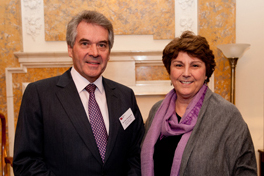 |
 |
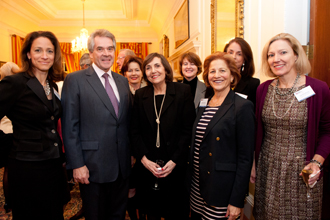 |
British Ambassador to the United States
Sir Peter Westmacott and moderator Karen DeYoung
|
|
Ambassador Westmacott with Board Members
Sarah Kahn, Mary Catherine Toker, Theresa Loar,
Isabel Jasinowski, Carolyn Brehm, Board Chair
Maxine Isaacs, and President Patricia Ellis
|
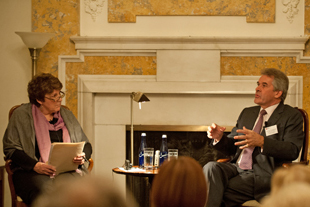 |
 |
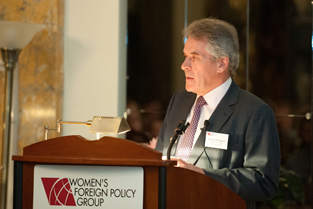 |
Ambassador Westmacott in conversation
with Karen DeYoung
|
|
Ambassador Westmacott addresses WFPG
|
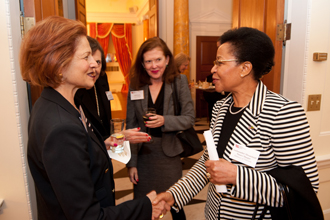 |
 |
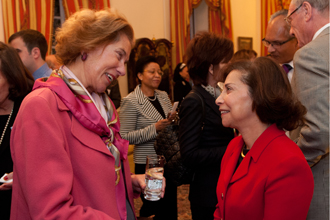 |
Maxine Isaacs greets Ambassador Mwandaidi
Sinare Maajar of Tanzania
|
|
Ambassador Elena Popotodorova of Bulgaria speaks
with Lady Susie Westmacott
|
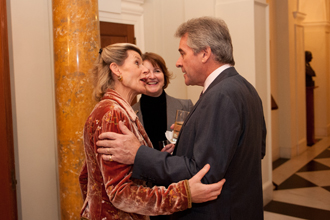 |
 |
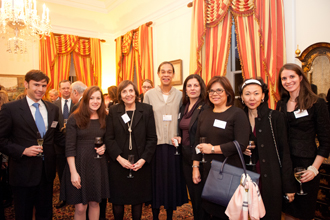 |
Ambassador Westmacott greets Board Members
Diana Villiers Negroponte and Theresa Loar
|
|
Patrick Ball, Emily Harter, Patricia Ellis,
Board Member Gail Kitch, Carolina Klein, Maria Montanez,
Maigul Nugmanova, and WFPG Associate
Director Kimberly Kahnhauser
|
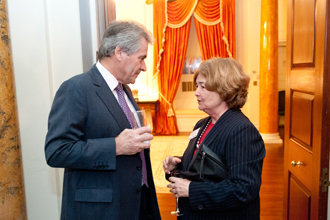 |
 |
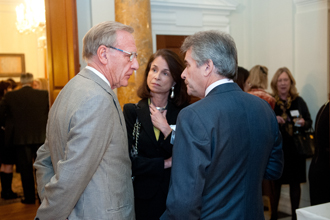 |
Board Member Dawn Calabia speaks
with Ambassador Westmacott
|
|
Ambassador Westmacott with Isabel and Jerry Jasinowski
|
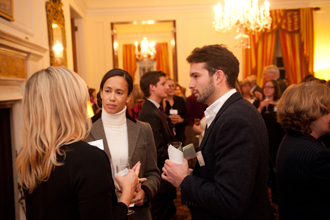 |
 |
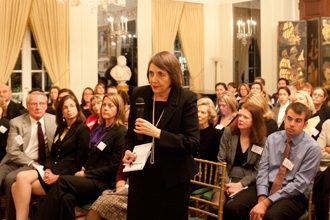 |
Members and guests at the reception
|
|
Patricia Ellis asks a question during Q&A
|
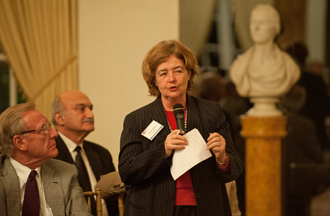 |
 |
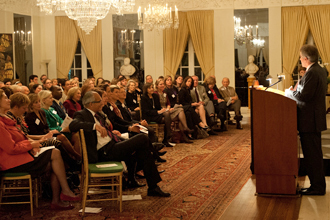 |
Dawn Calabia during the program Q&A
|
|
WFPG members and guests during
the Ambassador's address
|
| |
|
|
|
|